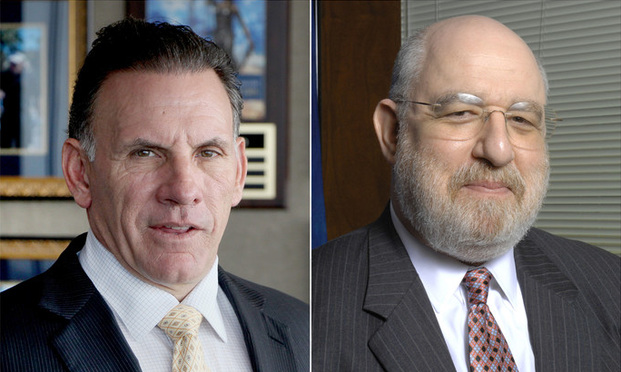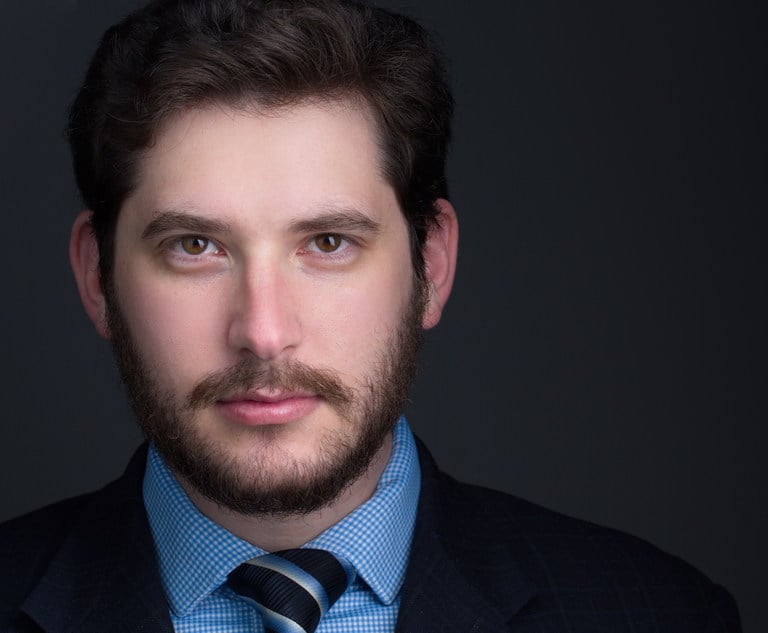Much-Debated 'Daubert' Standard Has Its Day in Florida Supreme Court
The court is being asked to rule on the standard Florida will use to admit scientific evidence, and the Florida Legislature decided its preference in 2013.
March 05, 2018 at 03:06 PM
4 minute read

Florida justices will hear arguments Tuesday in a closely watched case about which evidence standard the state's courts should use to admit expert opinions.
The civil and criminal defense bar supports the Daubert standard, which requires a trial judge to ensure the relevance and reliability of scientific testimony or evidence.
“It will keep junk science out of the courtroom,” said Jacksonville attorney Kansas Gooden of Boyd & Jenerette, who leads the amicus committee of the Florida Defense Lawyers Association. Daubert is used in all federal and most state courts.
But plaintiffs attorneys want Florida to keep the long-used Frye standard, which only asks the court to look at new or novel evidence to make sure it's based on generally accepted science.
The Daubert standard gives the trial judge “wide latitude” to determine admissibility of expert testimony. That latitude is often abused, said Miami attorney Jim Ferraro of the Ferraro Law Firm, who will argue for the petitioners Tuesday.
“It's been used to exclude people from court more often than not,” Ferraro said.
Tuesday's case, DeLisle v. Crane, marks the first time the Florida Supreme Court will directly consider adopting the Daubert standard, which was passed by the Florida Legislature in 2013. Last year, the court declined to adopt the amendment, finding a rule change would raise constitutional concerns, including access to justice that “must be left for a proper case or controversy.”
Richard DeLisle filed an asbestos lawsuit against Crane Co., R.J. Reynolds Tobacco Co. and several other defendants in 2013, just before the Legislature passed the Daubert amendment.
He won an $8 million verdict linking his mesothelioma to the defendants' products. But the Fourth District Court of Appeal reversed the decision, finding the judge should have excluded some expert testimony under Daubert.
DeLisle's attorneys argue the Daubert amendment is invalid because it's up to the Florida Supreme Court, not the Legislature, to determine court rules of procedure. Ferraro said the amendment came from a corporate-friendly, conservative statehouse and takes power out of the hands of juries to determine the reliability of evidence, giving it to a judge instead.
“When you get a collective group of six people together, you're more likely to get the correct answer than one person who went to law school,” Ferraro said.
The Florida Justice Association representing plaintiffs lawyers added in an amicus brief that the amendment would cause ”unwarranted delays, costs, and expenses in the administration of justice in every kind of case.”
“These delays, costs, and expenses will be borne not only by the courts but also by the litigants, and will tend to have the most adverse impact on those who lack financial resources,” the association wrote.
The respondents argue Daubert is constitutional and more flexible than Frye.
In the Daubert case, the U.S. Supreme Court in 1993 “liberalized the Frye standard by giving trial judges the authority to admit otherwise reliable scientific evidence even absent some showing of 'general acceptance,' ” Crane's attorneys wrote in a brief.
Richard Doran of Ausley McMullen in Tallahassee will argue on behalf of Crane, and Elliot Scherker of Greenberg Traurig in Miami will argue for R.J. Reynolds. Both respondents' attorneys declined to comment.
Defense attorneys on the civil and criminal sides also wrote to the court to support Daubert. The National Association of Criminal Defense Lawyers argued the Frye standard, which dates back to 1923, has led to wrongful convictions because it allows for ”flawed scientific evidence,” including bite mark analysis, hair microscopy and dog scent identification.
Gooden of the Florida Defense Lawyers Association said courts across the country have found Daubert does not affect consumers' right to a jury trial. She argues using a standard consistent with other states would prevent forum shopping in Florida.
“I don't believe that there's any access-to-court situation,” she said. “I believe Daubert levels the playing field. It provides stability in the law.”
The Florida Supreme Court will make the ultimate call after hearing Tuesday's arguments.
“I think it'll be close, one way or the other,” Ferraro said.
This content has been archived. It is available through our partners, LexisNexis® and Bloomberg Law.
To view this content, please continue to their sites.
Not a Lexis Subscriber?
Subscribe Now
Not a Bloomberg Law Subscriber?
Subscribe Now
NOT FOR REPRINT
© 2025 ALM Global, LLC, All Rights Reserved. Request academic re-use from www.copyright.com. All other uses, submit a request to [email protected]. For more information visit Asset & Logo Licensing.
You Might Like
View All
Tragedy on I-95: Florida Lawsuit Against Horizon Freight System Could Set New Precedent in Crash Cases
2 minute read
'You Lied to the Jury': Veteran Awarded $5 Million in Defamation Case Against CNN
4 minute read
Vedder Price Shareholder Javier Lopez Appointed to Miami Planning, Zoning & Appeals Board
2 minute readTrending Stories
- 1Paul Hastings, Recruiting From Davis Polk, Continues Finance Practice Build
- 2Chancery: Common Stock Worthless in 'Jacobson v. Akademos' and Transaction Was Entirely Fair
- 3'We Neither Like Nor Dislike the Fifth Circuit'
- 4Local Boutique Expands Significantly, Hiring Litigator Who Won $63M Verdict Against City of Miami Commissioner
- 5Senior Associates' Billing Rates See The Biggest Jump
Who Got The Work
J. Brugh Lower of Gibbons has entered an appearance for industrial equipment supplier Devco Corporation in a pending trademark infringement lawsuit. The suit, accusing the defendant of selling knock-off Graco products, was filed Dec. 18 in New Jersey District Court by Rivkin Radler on behalf of Graco Inc. and Graco Minnesota. The case, assigned to U.S. District Judge Zahid N. Quraishi, is 3:24-cv-11294, Graco Inc. et al v. Devco Corporation.
Who Got The Work
Rebecca Maller-Stein and Kent A. Yalowitz of Arnold & Porter Kaye Scholer have entered their appearances for Hanaco Venture Capital and its executives, Lior Prosor and David Frankel, in a pending securities lawsuit. The action, filed on Dec. 24 in New York Southern District Court by Zell, Aron & Co. on behalf of Goldeneye Advisors, accuses the defendants of negligently and fraudulently managing the plaintiff's $1 million investment. The case, assigned to U.S. District Judge Vernon S. Broderick, is 1:24-cv-09918, Goldeneye Advisors, LLC v. Hanaco Venture Capital, Ltd. et al.
Who Got The Work
Attorneys from A&O Shearman has stepped in as defense counsel for Toronto-Dominion Bank and other defendants in a pending securities class action. The suit, filed Dec. 11 in New York Southern District Court by Bleichmar Fonti & Auld, accuses the defendants of concealing the bank's 'pervasive' deficiencies in regards to its compliance with the Bank Secrecy Act and the quality of its anti-money laundering controls. The case, assigned to U.S. District Judge Arun Subramanian, is 1:24-cv-09445, Gonzalez v. The Toronto-Dominion Bank et al.
Who Got The Work
Crown Castle International, a Pennsylvania company providing shared communications infrastructure, has turned to Luke D. Wolf of Gordon Rees Scully Mansukhani to fend off a pending breach-of-contract lawsuit. The court action, filed Nov. 25 in Michigan Eastern District Court by Hooper Hathaway PC on behalf of The Town Residences LLC, accuses Crown Castle of failing to transfer approximately $30,000 in utility payments from T-Mobile in breach of a roof-top lease and assignment agreement. The case, assigned to U.S. District Judge Susan K. Declercq, is 2:24-cv-13131, The Town Residences LLC v. T-Mobile US, Inc. et al.
Who Got The Work
Wilfred P. Coronato and Daniel M. Schwartz of McCarter & English have stepped in as defense counsel to Electrolux Home Products Inc. in a pending product liability lawsuit. The court action, filed Nov. 26 in New York Eastern District Court by Poulos Lopiccolo PC and Nagel Rice LLP on behalf of David Stern, alleges that the defendant's refrigerators’ drawers and shelving repeatedly break and fall apart within months after purchase. The case, assigned to U.S. District Judge Joan M. Azrack, is 2:24-cv-08204, Stern v. Electrolux Home Products, Inc.
Featured Firms
Law Offices of Gary Martin Hays & Associates, P.C.
(470) 294-1674
Law Offices of Mark E. Salomone
(857) 444-6468
Smith & Hassler
(713) 739-1250







